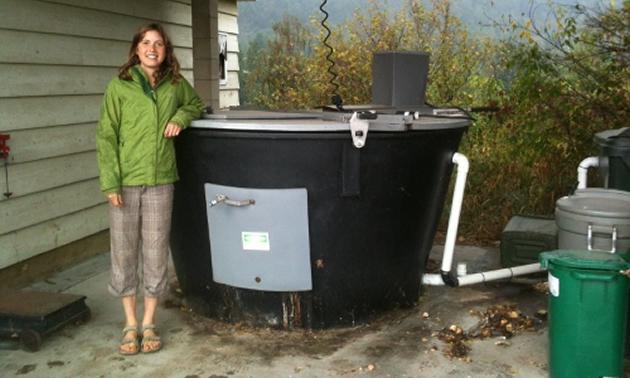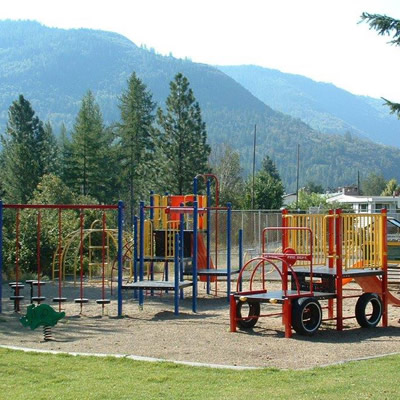Selkirk College improves environmental sustainability

Selkirk student, Cali Olleck, stands next to one of the college's large composters.
Conservation of the natural environment is strongly valued at Selkirk College, and as a result, the Environmental Sustainability Committee was created in 2008 to guide the college towards reaching sustainability goals.
Measuring up
In order to reach those goals and reduce Selkirk’s environmental impact, the committee conducted a baseline study to benchmark the college against environmental sustainability indicators including energy consumption, emissions, effluent and waste, water consumption, biodiversity and land management, products and services, and environmental compliance. Derek Marcoux, Selkirk’s past chair of the School of Environment and Geomatics, conducted the baseline study and looked at many indicators from other post-secondary institutions.
Once the study was complete and areas for improvement were identified, the college committed to using natural resources in a more efficient way. Many positive changes have taken place over the past five years and have resulted in more recycling, a reduction in fossil fuel use, less energy consumption and more innovative ways of using natural resources.
"We are very proud of the many changes toward environmental sustainability that have happened at the college over the past five years,” said Allison Lutz, Selkirk’s chair of the Environmental Sustainability Committee and Geography instructor. “Many of the changes are a result of the commitment and hard work of college employees, in particular the maintenance, cafeteria and IT staff who implement those improvements."
Selkirk’s environmental sustainability highlights
Selkirk students, staff and faculty are working hard to make Selkirk a greener place. Many changes and improvements have been made and below are the highlights:
- Reducing the number of paper printers, using recycled paper and printing more efficiently.
- Composting, using biodegradable dish ware and converting to biodiesel throughout college food practices.
- Upgrading lighting, heating and air exchanges to reduce energy consumption.
- Installing more energy-efficient boiler plants in Castlegar and Nelson buildings to reduce natural gas consumption and installing a hybrid boiler system in Castlegar. Both upgrades will reduce college Greenhouse Gas emissions by up to 20 per cent overall.
- Installing solar panels and double-glazed windows to reduce energy consumption.
- Building new structures with geothermal heating systems, including Castlegar’s MIR Centre for Peace and Nelson’s Tenth Street Residence.
- Building structures to the Leadership in Energy and Environmental Design (LEED) Gold Standard, including the Gathering Place in Castlegar and Nelson’s Tenth Street Residence.
- Ensuring a more positive partnership between producers and consumers by becoming a certified Fair Trade Campus.
- Using less pesticides and herbicides and cutting the lawn less often to reduce the use of fossil fuels.
- Measuring above- and below-ground forest carbon on college grounds in a project that will help educate, develop tools for improvements and ultimately reduce the carbon footprint of the college.
Through Selkirk’s classes, students can also focus on environmental stewardship in the Integrated Environmental Planning program and the Renewable Energies Certificate program, or participate in the Environmental Club, where they can partake in shoreline clean-ups and work to educate others about environmental issues.
Living Selkirk’s vision and values
“Environmental sustainability is extremely important to Selkirk College and I’d like to commend all our staff, students and faculty for working hard to make our campuses greener,” said Angus Graeme, Selkirk’s president and CEO. “We’ll continue to focus on conserving our natural environment and making positive changes where we can.” Improving Selkirk’s environmental sustainability is a part of the college’s Strategic Plan and its core values.
For more information on the Environmental Sustainability Committee or environmental initiatives, please contact Allison Lutz, chair of the Environmental Sustainability Committee and Geography Instructor.
Learn more about Selkirk’s sustainability initiatives. Visit Selkirk’s Facebook page.





Comments